| Srl | Item |
| 1 |
ID:
108100
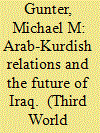

|
|
|
|
|
| Publication |
2011.
|
| Summary/Abstract |
The Iraqi Kurds now not only possess their most powerful regional government since the creation of Iraq following World War I (the Kurdistan Regional Government-krg), but also play a prominent role in the Iraqi government in Baghdad, holding the posts of president, foreign minister and several other cabinet positions. After a great deal of wrangling, the Kurds managed to maintain their strong position in al-Maliki's new Baghdad government finally cobbled together in December 2010. This dual governmental role stood in marked contrast to the situation that existed before the events of 1991 and 2003, when the Kurds were treated as second class citizens and worse. The ultimate question is for how long this unique Kurdish position of strength will last. Many Arabs still resent the Kurdish claims to autonomy as a challenge to the Arab patrimony and see a federal state for the Iraqi Kurds within Iraq as simply a prelude to secession forced upon the Arabs at a moment of temporary weakness following the war in 2003. When will the Iraqi Arabs organise themselves and start trying to reduce the power of the Kurds again? This paper will analyse this developing situation and tentatively conclude that the two sides are most likely to continue to coexist in a troublesome but peaceful relationship.
|
|
|
|
|
|
|
|
|
|
|
|
|
|
|
|
| 2 |
ID:
075453


|
|
|
| 3 |
ID:
174178


|
|
|
|
|
| Summary/Abstract |
If the influence of geography on politics (geopolitics) is a useful key to understand international relations, the factor of water (hydropolitics) is even more important. Michael M Gunter focuses on one small but important aspect of hydropolitics and assesses the influence of US Admiral Alfred Thayer Mahan’s theories of sea power on contemporary Chinese naval strategy.
|
|
|
|
|
|
|
|
|
|
|
|
|
|
|
|
| 4 |
ID:
060944
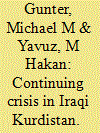

|
|
|
| 5 |
ID:
105671
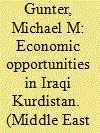

|
|
|
| 6 |
ID:
149124
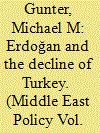

|
|
|
|
|
| Summary/Abstract |
Recep Tayyip Erdoğan — Turkey's current president (elected 2014) and former prime minister (2003–14) — in his first decade in power, won three parliamentary elections by ever-larger shares of the popular vote because he had helped to build Turkey into a burgeoning economic powerhouse and a moderate Islamic democracy. In the past half-decade, however, despite winning Turkey's first popular election for president in August 2014 and presiding over another great parliamentary victory in November 2015, Erdoğan's increasing authoritarianism has helped precipitate the disastrous decline of the nation as well as his own inevitable fall from power. What happened, and what lessons can be gleaned? Can Turkey's decline be reversed and its progress revived?
|
|
|
|
|
|
|
|
|
|
|
|
|
|
|
|
| 7 |
ID:
159595


|
|
|
| 8 |
ID:
158825


|
|
|
| 9 |
ID:
170482


|
|
|
| 10 |
ID:
142157


|
|
|
|
|
| Summary/Abstract |
The rise of the Kurdistan Regional Government (KRG) in northern Iraq as well as the ongoing insurgency of the Kurdistan Workers Party (PKK) and now peace negotiations with the Turkish government have empowered the Kurds and challenged the existing political map of the Middle East. On July 19, 2012, the previously quiescent Syrian Kurds — largely under the leadership of the Democratic Union Party (PYD), closely associated with the PKK — also suddenly emerged as a potential game changer in the Syrian civil war and what its aftermath might hold for the future of the Middle East. In an attempt to consolidate an increasingly desperate position, government troops were abruptly pulled out of the major Kurdish areas.1 The Kurds in Syria had suddenly become autonomous, a situation that also affected neighboring Turkey and the virtually independent KRG in Iraq. Indeed, the precipitous rise of the Kurds in Syria could become a factor in changing the artificial borders of the Middle East established after World War I by the notorious Sykes-Picot Agreement
|
|
|
|
|
|
|
|
|
|
|
|
|
|
|
|
| 11 |
ID:
068364


|
|
|
| 12 |
ID:
096623


|
|
|
| 13 |
ID:
000698
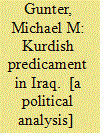

|
|
|
|
|
| Publication |
London, Macmillan, 1999.
|
| Description |
x, 181p.hbk
|
| Standard Number |
033377535X
|
|
|
|
|
|
|
|
|
|
|
|
Copies: C:1/I:0,R:0,Q:0
Circulation
| Accession# | Call# | Current Location | Status | Policy | Location |
| 042110 | 956.72/GUN 042110 | Main | On Shelf | General | |
|
|
|
|
| 14 |
ID:
082108
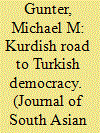

|
|
|
| 15 |
ID:
121769


|
|
|
|
|
| Publication |
2013.
|
| Summary/Abstract |
The purpose of this article is to survey the Kurdish Spring (demands for meaningful democracy along with cultural, social, and political rights and their immediate implementation) that has occurred in the aftermath of the much better known Arab Spring which began in late 2010. To this end it analyses the situation in Turkey, Iraq and Syria. In Turkey the failure of the government's much heralded Kurdish Opening and the prospects for its renewal are investigated. This includes the continuing kck arrests and sentencings that seem more a war on dissent than on terror. In Iraq the rise of the Gorran Party, anti-government demonstrations which occurred in 2011, and Kurdistan Regional Government (krg) president Massoud Barzani's recent hints that the krg will declare independence are discussed. The failure to agree on a hydrocarbons law and on a boundary for the krg are two major reasons for Barzani's position. For Syria the article analyses the assassination of Mishaal Tammo in October 2011 and the rise of the pkk-affiliated pyd against the background of Syria suddenly becoming a major factor in the Kurdish Spring. Iran's relative quiescence will also be noted.
|
|
|
|
|
|
|
|
|
|
|
|
|
|
|
|
| 16 |
ID:
049044


|
|
|
|
|
| Publication |
Hampshire, macmillan Press, 1997.
|
| Description |
184p.
|
| Standard Number |
0333713613
|
|
|
|
|
|
|
|
|
|
|
|
Copies: C:1/I:0,R:0,Q:0
Circulation
| Accession# | Call# | Current Location | Status | Policy | Location |
| 039257 | 305.8009561/GUN 039257 | Main | On Shelf | General | |
|
|
|
|
| 17 |
ID:
099326


|
|
|
| 18 |
ID:
172030
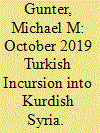

|
|
|
|
|
| Summary/Abstract |
On October 9, 2019, after many false starts, Turkey finally drove into a small section of northeastern Syria in an attempt to establish a “safe zone” to end what it claimed to be an existential Kurdistan Workers Party (PKK) threat to its territorial integrity. President Donald J. Trump's decision to pull out some 1,000 U.S. troops acting as advisers, supporters and protectors of the PKK‐affiliated Democratic Union Party/Peoples Defense Units/Syrian Democratic Forces (PYD/YPG/SDF), or simply the Syrian Kurds, triggered the Turkish incursion. Widespread condemnation of Turkey and Trump quickly ensued. Detractors argued that the United States had (1) dishonorably deserted its Syrian Kurdish ally, (2) alienated future allies who would no longer trust it, (3) allowed some of the Islamic State of Iraq and Syria (ISIS) prisoners incarcerated by YPG guards to escape and potentially revive the genocidal jihadist organization, (4) rewarded Turkish aggression, (5) handed the murderous but exhausted Assad regime new life, (6) facilitated Iran's drive to the Mediterranean and potential threat to Israel, and, maybe most of all, (7) empowered Russia as the ultimate arbitrator of the Syrian imbroglio, to the detriment of the United States and the North Atlantic Treaty Organization (NATO). The purpose of this article is to set the background to this problematic situation and analyze its immediate and long‐term implications.
|
|
|
|
|
|
|
|
|
|
|
|
|
|
|
|
| 19 |
ID:
143108


|
|
|
|
|
| Summary/Abstract |
This article suggests a combination of military, political, and diplomatic approaches for Western states to combat the Islamic State in Iraq and al-Sham (ISIS). In Syria, support should be strengthened for the only effective moderate force fighting against ISIS: the Kurdish militias. In Iraq, where ISIS relies on local partners from Sunni Arab tribes to help govern, it is incumbent on the West to break this coalition in order to hamper ISIS's military operations and weaken its governing capacity.
|
|
|
|
|
|
|
|
|
|
|
|
|
|
|
|
| 20 |
ID:
147945


|
|
|